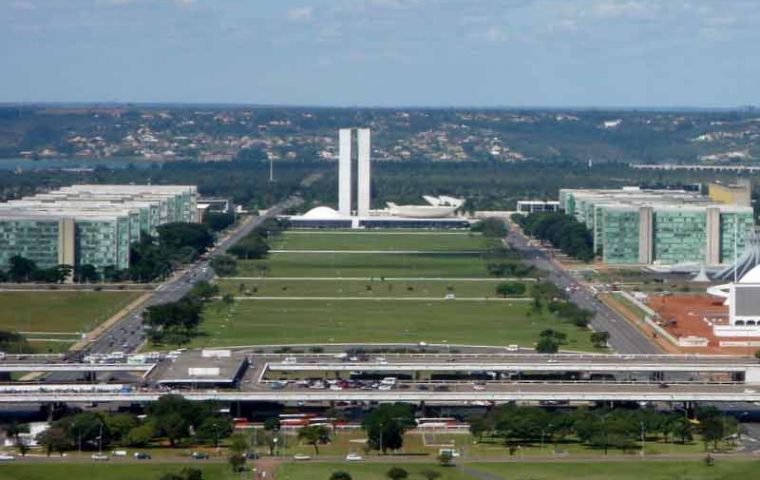MercoPress. South Atlantic News Agency
Brazilian has 190.7 million population, and 14.6 million illiterates
 The capital Brasilia has the best marks
The capital Brasilia has the best marks Brazil’s population reached 190.7 million according to primary data collected from the 2010 demographic census and released Friday by the Brazilian Geography and Statistics Institute, IBGE. The census also showed that almost 10% of the population is illiterate.
On closing day of the 2010 census, the total Brazilian population was 190.755.779 which means an average annual rate of increase of 1.17% from the previous census in 2000.
The states with the largest population are in the south-east beginning with Sao Paulo, 41.26 million; Minas Gerais, 19.59 million and Rio do Janeiro, 15.98 million.
The south-east of Brazil which also includes the state of Santo Spirito, concentrates 42.1% of the population. The census also showed that women are 51% of total population.
In the last ten years illiteracy dropped four percentage points to 9.6%, which means 14.6 million Brazilians can’t read or write. In 2000 illiteracy was 13.6% and currently 70% of all illiterates are rural population, says IBGE.
The north-east of the country which is also the poorest has an illiteracy rate of 17%, the highest, which contrasts with south Brazil where the rate is 4.7%
The worst state is Alagoas, north-east, where 22.52% of the population have been illiterate for over ten years.
The states with top marks are the capital Brasilia, 3.25%; followed by Santa Catarina, 3.86%; Rio do Janeiro and Sao Paulo both with 4.09% illiteracy.




Top Comments
Disclaimer & comment rules-

Read all commentsIBGE's 'Illiteracy' is not simply the flip-side of the 'literate' coin.
Apr 30th, 2011 - 11:24 pm 0To be FUNCTIONALLY LITERATE is the OECD worldwide measure of literacy;
and here the population fares much more poorly.
On any measure of
(i) sophisticated use of language,
(ii) knowledge of the structure of language, and
(iii) the interpretation of standard texts,
the performances are much, much worse.
This is totally understandable since most of the Brasilian *adult* population never progressed beyond primary school, and in many States high proportions never regularly attended any school or never completed primary phase.
For the last 10 years, with the introduction of the Bolsa programmes, school attendance has been linked to 'social security' payments (though this has been progressively failing in the last few years.)
The Federal Education Budget has been diverted disproportionately into tertiary education (uni),
and state secondary has been the poor, under-provided sector.
Primary sector teaching has been, and still is, 'Poor' and 'Politicised' (OECD).
The key reference is: http://www.oecd.org/dataoecd/52/33/46581300.pdf
Key statements:
”Rios (Embraer HR) noted that the link between education and development is critical to Brazil’s future in a competitive global environment, and the status quo cannot get the country where it needs to go.”
“The limited number of university spaces enables only 15% of (those that went on to secondary) students to attend university; only 10% graduate because of their poor preparation in basic and secondary education.
This is one more reason why it is difficult to motivate young people to strive for education excellence in high school.”
Please read it before trying to refute my statements.
Commenting for this story is now closed.
If you have a Facebook account, become a fan and comment on our Facebook Page!